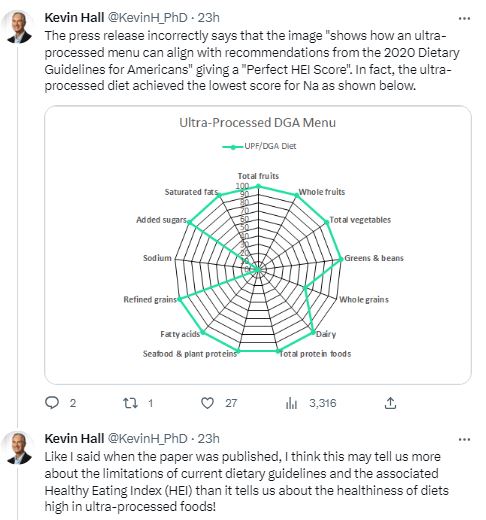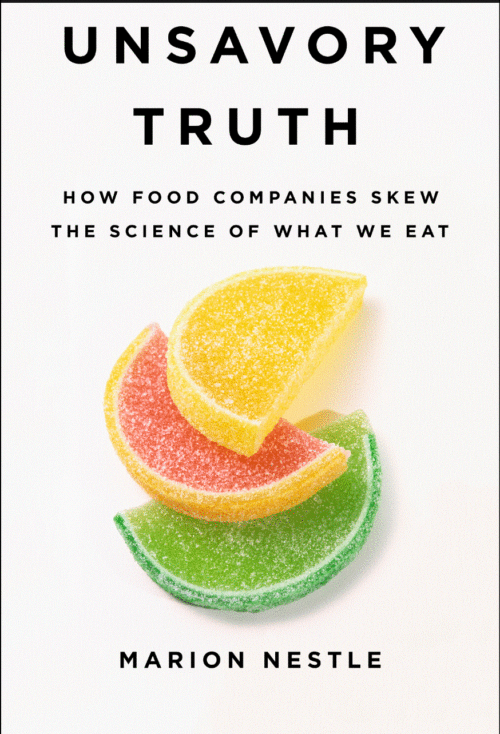I am devoting this week to the pushback against advice to reduce consumption of ultra-processed foods. It is coming from the food industry, of course, government agencies with ties to the food industry, and nutritionists who focus on the benefits of nutrients, without contextualizing the foods and diets they come from (“nutritionism”).
For the record, ultra-processed foods are :
- Industrially produced
- Bear little resemblance to the foods they were derived from
- Typically contain additives for color, flavor, and texture
- Cannot be made in home kitchens,
- Are formulated to be irresistable,
- Are associated with excessive calorie intake and poor health
- Are extremely profitable to their makers
- Cannot be made in home kitchens (a brief operating definition)
Ultra-processed food pushback #1: A study from the USDA and authors with conflicted interests
The USDA’s Agricultural Research Service is so proud of this study that it sent out a press release.
Scientists at the USDA Agricultural Research Service’s (ARS) Grand Forks Human Nutrition Research Center led a study that demonstrates it is possible to build a healthy diet with 91 percent of the calories coming from ultra-processed foods (as classified using the NOVA scale) while still following the recommendations from the 2020-2025 Dietary Guidelines for Americans (DGA). The study highlights the versatility of using DGA recommendations in constructing healthy menus.
The Study: Dietary Guidelines Meet NOVA: Developing a Menu for A Healthy Dietary Pattern Using Ultra-Processed Foods. Julie M. Hess, Madeline E. Comeau, Shanon Casperson, Joanne L. Slavin, Guy H. Johnson, Mark Messina, Susan Raatz, Angela J. Scheett, Anne Bodensteiner, Daniel G. Palmer. The Journal of Nutrition, 2023. https://doi.org/10.1016/j.tjnut.2023.06.028.
Purpose: “The purpose of this proof-of-concept study was to determine the feasibility of building a menu that aligns with recommendations for a healthy dietary pattern from the 2020 DGA and includes ≥80% kcal from UPF as defined by NOVA.”
Method: “we first developed a list of foods that fit NOVA criteria for UPF, fit within dietary patterns in the 2020 DGA, and are commonly consumed by Americans. We then used these foods to develop a 7-d, 2000 kcal menu modeled on MyPyramid sample menus and assessed this menu for nutrient content as well as for diet quality using the Healthy Eating Index-2015 (HEI-2015).”
Results: “In the ultra-processed DGA menu that was created, 91% of kcal were from UPF, or NOVA category 4. The HEI-2015 score was 86 out of a possible 100 points.”
Conclusions: “Healthy dietary patterns can include most of their energy from UPF, still receive a high diet quality score, and contain adequate amounts of most macro- and micronutrients.”
Conflicts of Interest: “MM serves as the Director of Nutrition Science and Research for the Soy Nutrition Institute (SNI) Global. The SNI Global receives funding from soybean farmers via the soybean national checkoff program and via membership dues from companies involved in manufacturing and/or selling soy ingredients and/or soyfoods. GHJ serves as Senior Advisor to the McCormick Science Institute. JLS serves on advisory/consultant boards for Simply Good Foods, Quality Carbohydrates Coalition, and the Sustainable Nutrition Scientific Board and has received funding from the National Institutes of Health, Taiyo, Barilla Foods, and the USDA in the past 12 mo. The other authors report no conflicts of interest.”
Funding: This work was supported by USDA Agricultural Research Service project grant #3062-51000-057-00D.
Comment: I can think of only one reason for doing a study like this: to cast doubt on the concept of ultra-processed foods (UPF) and all the research showing that UPF diets induce people to eat more calories (see the study by Kevin Hall et al) and are strongly associated in hundreds of studies with poor health, evidence that by this time is overwhelming and incontrovertible. Why now? Because the 2025-2030 Dietary Guidelines Advisory Committee has been charged with examining the relationship of UPF to heart disease risk.
The first rule of the ‘Playbook” is to cast doubt on the research, which is what we are seeing here. The message to reduce consumption of ultra-processed foods makes good sense for health reasons. But such advice is very bad for the profits of food companies making junk foods.
The USDA’s Agricultural Research Service is a marketing arm of the food industry,. It is heavily conflicted.
For one thing, the Healthy Eating Index is not useful for this purpose; it is strictly nutrient-based, which is not the issue here. And the Dietary Guidelines are careful to leave plenty of room for eating junk foods and to say not one word about UPF.
I think the UPF concept is so solidly backed up by evidence that it is here to stay. But it is so threatening to food companies making UPF products, and the USDA is so captured by the food industry (checkoff programs, anyone?) that it is understandable why they are so eager to cast doubt.
Thanks to the half dozen or so readers who sent this one to me, to Ted Kyle for calling it “oxymoronic healthy eating,” and Kevin Hall for pointing out that the healthfulness of this diet is assumed, not tested:





